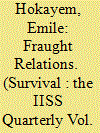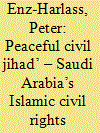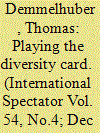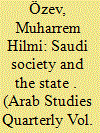|
|
|
Sort Order |
|
|
|
Items / Page
|
|
|
|
|
|
|
| Srl | Item |
| 1 |
ID:
188450


|
|
|
|
|
| Summary/Abstract |
The recalibration of Saudi foreign policy under Crown Prince Muhammad bin Salman (MbS) reflects Riyadh’s changing assessment of its relationship with the United States and its ambition to become a full-fledged geo-economic power that is less constrained by the traditional pillars of Saudi statecraft. While much attention is being paid to the acrimonious relationship between MbS and US President Joe Biden, there are structural reasons for the growing divergence between the two countries. The October 2022 OPEC+ crisis over Saudi Arabia’s oil-production cut illustrates how Riyadh is willing to prioritise its financial and energy interests even at the risk of upsetting its long-time security partner.
|
|
|
|
|
|
|
|
|
|
|
|
|
|
|
|
| 2 |
ID:
173550


|
|
|
|
|
| Summary/Abstract |
Religious supremacy has been one of the most important factors in West Asia since the inception of Abrahamic religions. As each religion held its supremacy for a period in time, it gave rise to renaissance within the religion.
|
|
|
|
|
|
|
|
|
|
|
|
|
|
|
|
| 3 |
ID:
183752


|
|
|
|
|
| Summary/Abstract |
In the 2000s CE, Saudi Arabia saw the emergence of the civil rights group HASM (or ACPRA), whose members engaged in civil society activism for basic rights and argued that their activism could be described as peaceful, civil jihad. In their books, declarations and lectures, HASM’s members presented a complex Islamic theory of civil society activism and explained why they considered what they were doing legitimate. Their theory above all rested on the idea that civil society activism was a form of jihad and superior of other forms, like military jihad. This paper focusses on HASM’s concept of peaceful, civil jihad. It is a complex concept, which is based on the ideas of some twentieth and twenty-first century Islamic scholars, but nevertheless constitutes a new interpretation of the term jihad. HASM’s idea that civil society activism is peaceful, civil jihad is not only relevant in the Saudi context. Rather, it is a significant contribution to the ongoing debate about the meaning of jihad in modern Muslim societies.
|
|
|
|
|
|
|
|
|
|
|
|
|
|
|
|
| 4 |
ID:
169224


|
|
|
|
|
| Summary/Abstract |
Since the 2003 regime change in Iraq and the 2011 Arab uprisings, the political map of the Middle East has been in flux. Regional actors have taken advantage of emerging windows of opportunity, which have affected the outcome of this process. Saudi Arabia’s role as an aspiring regional hegemon in the region is salient: the country’s assertive course in shaping its neighbourhood coincides with a more independent foreign policy that goes beyond the traditional US alliance and seeks to diversify its international partners. This diversification of Saudi foreign policy since the ascension to the throne of King Salman in 2015 is explained by using the IR concept of hedging.
|
|
|
|
|
|
|
|
|
|
|
|
|
|
|
|
| 5 |
ID:
156629


|
|
|
|
|
| Summary/Abstract |
This article considers religious, social, political, and economic dimensions of the
Saudi-Wahhabi state imagination. Since the inception, the Saudi state has relied on two
main pillars: the monarchy and Wahhabism, which have been in a symbiotic relationship.
In time, the state imagination in Saudi Arabia has been determined and reconstructed
by factors like Wahhabism, monarchism, rentierism, internal and international political
and economic obligations, and modernization efforts imposed by being a “nation state.”
Those factors made Saudi Arabia a sui generis state. The legitimacy of the monarchy has
been ensured through tribalism and, on a larger scale, religion. Foreign aid, booties, oil
revenues, and, on a rather insignificant scale, tax revenues have created a material infrastructure
to build citizenship.
|
|
|
|
|
|
|
|
|
|
|
|
|
|
|
|
|
|
|
|
|